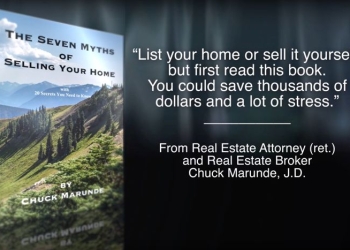How to sell a home is one of the most important “how to’s” of the day. Most sellers would readily acknowledge that they are not experts in marketing and selling a home in today’s economy. As a result, sellers do the best they can by doing some reading, by talking to people they know, and perhaps interviewing a couple of real estate agents. Most sellers will use their life experiences or previous career experiences to help them filter through all the information and make decisions they feel will help them sell their homes.
How to Sell a Home
 One of the challenges sellers have today when it comes to how to sell a home is that times have changed. Their experience and knowledge from previous decades is not necessarily a reliable foundation for marketing decisions today. Remember when print newspapers and real estate magazines at the news stands were so popular? On weekends buyers would comb the Sunday issue of the newspapers and browse hundreds of listings and then simply call the listing agents on the ads. This was the buyer’s most effective way to find their home for decades. Newspapers made a fortune selling advertising to real estate companies for a long time, and then . . . suddenly brokers quit paying for mass print advertisements. Why? What happened?
One of the challenges sellers have today when it comes to how to sell a home is that times have changed. Their experience and knowledge from previous decades is not necessarily a reliable foundation for marketing decisions today. Remember when print newspapers and real estate magazines at the news stands were so popular? On weekends buyers would comb the Sunday issue of the newspapers and browse hundreds of listings and then simply call the listing agents on the ads. This was the buyer’s most effective way to find their home for decades. Newspapers made a fortune selling advertising to real estate companies for a long time, and then . . . suddenly brokers quit paying for mass print advertisements. Why? What happened?
How to Sell a Home Dramatically Changed
Buyers changed. That is, buyers no longer use print newspapers or print magazines to search for their homes. Most sellers get this, but what they may not know is that this is just the tip of the iceberg on the subject of how to sell a home. The death of the American newspaper is symptomatic of a much larger marketing paradigm shift. Much larger.
What’s fascinating to me is that while buyers changed how they shop for homes, traditional real estate brokerages around the country didn’t recognize that, and they refused to adapt their advertising methods for sellers. For several years brokers and agents have continued to advertise in print newspapers even though they openly admitted to each other that newspaper advertising no longer brought them buyers (neither phone calls nor walk-ins). For sellers this meant they weren’t connecting with buyers, and they weren’t selling their homes. For traditional brokerages this meant they were throwing advertising money over the bridge, and it finally caught up with many brokers around the country who realized they could no longer afford to pay for advertising in newspapers. Many major newspapers around the country have been left with huge unpaid advertising bills by major brokerages. Brokers have been going out of business all over the country, and even Sequim has seen a drop in agents from 258 in 2008 to only 107 today. The point is that sellers who have relied on a traditional marketing approach to sell their homes have gotten caught in all of this wasted effort and misspent advertising dollars.
The print newspaper industry continues to shrink. The Washington Post published this today:
Many daily newspapers have been moving away from paper for years, emphasizing digital news. To try to combat the industry’s decline in readership, advertising and profits, a handful of newspapers are now cutting back their publishing schedules from seven days a week in print to just three. The latest to go to three days a week: The storied New Orleans Times-Picayune, one of America’s oldest papers [175 years old], which announced Thursday that it plans to limit its print schedule beginning this fall to Wednesday, Friday and Sunday editions.
Locally, we have seen both our newspapers shrink for several years. The Sequim Gazette is a fraction of the size it once was, and they are fortunate they only publish one day a week. Unfortunately, they still have a tremendous amount of expensive bricks-and-mortar overhead. The newspaper’s owner, Brown Maloney, sold the paper recently after years of steady advertising declines. A newspaper conglomerate bought the Gazette, which gives the paper money to last for a few more years presumably, but will that company want to continue to carry the paper if it operates in the red like so many other papers? I predict the Sequim Gazette will have to adapt their business model, including their print version and their digital version. If they do not, they will go the way of many other newspapers. On an industry wide basis, I’m not convinced the newspaper industry can adapt fast enough. Imagine a locomotive engineer who has operated a train for 30 years suddenly being told he must transition to operating a space shuttle. Would he be able to make the transition?
The Peninsula Daily News has also been shrinking steadily for years, especially its classified and other advertising sections. I honestly wonder how long the PDN can hang on. Hopefully for many years to come, but the point really is that buyers have moved on. Buyers no longer buy and read print newspapers like they once did. I expect the PDN to announce before long that they will publish their print version only three days a week. I predicted that about three years ago, so I’m surprised it hasn’t happened already.
When we talk about how to sell a home, we must take this into consideration. Buyers are no longer shopping for their homes in print newspapers. They are not eagerly waiting to buy the Sunday newspaper to browse the home section. This is true all over the country. No wonder the newspapers are slowly dying. Homeowners who have listed their homes with agents who rely primarily on newspaper ads in the Sunday edition are actually operating out of a business model that died years ago.
But the real implications for sellers are much bigger. What’s happening to print newspapers is just the tip of the iceberg. When it comes to a full discussion of how to sell a home in this economy, we have to look at how buyers are shopping for their homes, how they filter through the homes they do find, how they search for and hire a real estate agent, and how they collect and filter information in the process. I’ve written two books and hundreds of articles on various aspects of the dramatic changes taking place in the real estate business. Buyers’ changing behaviors have definitely changed how to sell a home.
If you’re a homeowner who is thinking lately about how to sell a home in this market, may I suggest a couple of simple things? First, I don’t recommend just calling any Realtor with the assumption that because he or she has a license that he or she is an expert on all of this. If I may be bluntly honest here, the majority of real estate agents around the country haven’t yet comprehended how to bridge the gap from the broken traditional approach to the new world of marketing. Most agents are still using a very old model, one that still relied on the “print newspaper” approach to selling real estate. This may be obvious as you are reading this, but you might be surprised to learn how many homeowners simply call an agent and have them list their home. Then after a year of little or no activity and a clearly failed approach to marketing, a homeowner will start to ask questions they should have asked before they hired an agent to list their home.
When it comes to answering the question about how to sell a home, you don’t have to become an expert yourself. There’s not enough time for that. But you do need to know what the issues are and how to ask relevant questions of the Realtors you interview to list your home.
Suggestion on How to Sell a Home
Perhaps you can tell that I am passionate about this subject and how to sell a home in this recession. My suggestion is that you and I sit down for two hours, and let’s flush out the issues that answer the questions about how to sell a home in this market. I will share things with you that no one has told you, and that no other Realtors are talking about. I will also share secrets with you that I don’t share publicly, secrets that will help to answer some questions for you about how to sell a home in today’s market.
Last Updated on May 25, 2012 by Chuck Marunde



























